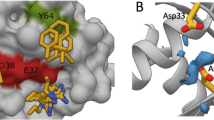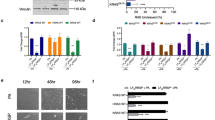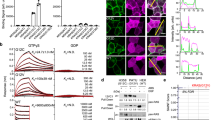Abstract
The farnesyltransferase (FTase) inhibitor FTI-277 is highly effective at blocking oncogenic H-Ras but not K-Ras4B processing and signaling. While inhibition of processing and signaling of oncogenic K-Ras4B is more sensitive to the geranylgeranyltransferase I (GGTase I) inhibitor GGTI-286 than it is to FTI-277 in K-Ras4B-transformed NIH3T3 cells, the sensitivity of K-Ras as well as H- and N-Ras to the CAAX peptidomimetics in human tumor cell lines is not known. Here, we report that a panel of five human carcinoma cell lines from pancreatic, pulmonary, and bladder origins all express H-, N-, and K-Ras, and their respective prenylation sensitivities to the FTase and GGTase I inhibitors is variable. In all of the cell lines investigated, the prenylation of N-Ras was highly sensitive to FTI-277, and in two of the cell lines, N-Ras showed slight sensitivity to GGTI-298, an analog of GGTI-286. Although the prenylation of H-Ras was also sensitive to FTI-277, complete inhibition of H-Ras processing even at high concentrations of FTI-277 and/or GGTI-298 was never achieved. The prenylation of K-Ras, on the other hand, was highly resistant to FTI-277 and GGTI-298. Most significantly, treatment of human tumor cell lines with both inhibitors was required for inhibition of K-Ras prenylation. In one cell line, the human lung adenocarcinoma A-549, prenylation of K-Ras was highly resistant even when co-treated with both inhibitors. Furthermore, soft agar experiments demonstrated that in all the human tumor cell lines tested inhibition of K-Ras prenylation was not necessary for inhibition of anchorage-independent growth. In addition, although GGTI-298 had very little effect on soft agar growth, the combination of FTI-277 and GGTI-298 resulted in significant growth inhibition. Therefore, the results demonstrate that while FTI-277 inhibits N-Ras and H-Ras processing in the human tumor cell lines evaluated, inhibition of K-Ras processing requires both an FTase inhibitor as well as a GGTase I inhibitor, and that inhibition of human tumor growth in soft agar does not require inhibition of oncogenic K-Ras processing.
This is a preview of subscription content, access via your institution
Access options
Subscribe to this journal
Receive 50 print issues and online access
$259.00 per year
only $5.18 per issue
Buy this article
- Purchase on Springer Link
- Instant access to full article PDF
Prices may be subject to local taxes which are calculated during checkout
Similar content being viewed by others
Author information
Authors and Affiliations
Rights and permissions
About this article
Cite this article
Lerner, E., Zhang, TT., Knowles, D. et al. Inhibition of the prenylation of K-Ras, but not H- or N-Ras, is highly resistant to CAAX peptidomimetics and requires both a farnesyltransferase and a geranylgeranyltransferase I inhibitor in human tumor cell lines. Oncogene 15, 1283–1288 (1997). https://doi.org/10.1038/sj.onc.1201296
Received:
Revised:
Accepted:
Issue Date:
DOI: https://doi.org/10.1038/sj.onc.1201296
Keywords
This article is cited by
-
YB-1 activating cascades as potential targets in KRAS-mutated tumors
Strahlentherapie und Onkologie (2023)
-
An early clinical trial of Salirasib, an oral RAS inhibitor, in Japanese patients with relapsed/refractory solid tumors
Cancer Chemotherapy and Pharmacology (2018)
-
Tipifarnib-mediated suppression of T-bet-dependent signaling pathways
Cancer Immunology, Immunotherapy (2012)
-
Isoprenoids and Related Pharmacological Interventions: Potential Application in Alzheimer’s Disease
Molecular Neurobiology (2012)
-
Oncogenic Ras abrogates MEK SUMOylation that suppresses the ERK pathway and cell transformation
Nature Cell Biology (2011)



